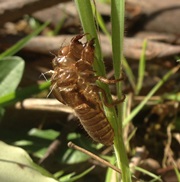Species of the Month – the Tea-tree Fire-tail Cicada
Tea-tree Fire-tail Cicada
The Tea-tree Fire-tail cicada has recently emerged in the lower south east of South Australia. It is a very high pitched and soft calling species that prefers Swamp Gum woodlands in the moist parts of the region especially around Glencoe and Port MacDonnell.
The larval stage of a cicada is spent beneath the ground feeding on the roots of host plants, sometimes shrubs and grasses other times trees. It is thought that the Tea-tree Firetail’s larval stage feed on the roots of Swamp gums then emerge each year in late October.
The recent hot spell has encouraged their emergence much earlier than previously recorded. The larvae crawl out from underground via a shallow tunnel and climb up onto the trunk of a tree or grass stem. At this point the insect then splits out from its nymphal shell, expands its wings and there you have it, an adult cicada.
Previous to a study undertaken in the early 2000s this species was not known to occur in South Australia and currently still remains as an un-described species. It is known to occur in south-west Victoria but beyond that district there are no records, however cousins to this species occur throughout south-eastern Australia.
The males call to attract a female. They do this continuously when the weather is sunny and warm through vibrating membranes in their abdomen. Once a female has become receptive she attracts him by clapping her wings together at a precise moment during his call. I was fortunate to witness the female wing clapping and take a recording a few years ago out at Wandilo, which you can hear (if you listen very carefully – headphones might help) by clicking here.
The males call sounds like “zeeeeeeeert zip zip”. The females wing clap occurs twice amongst this at the precise moment shown below (sonogram).
Interestingly, the male Tea-tree Fire-tails can be tricked into thinking we are a female, believe it or not. If you can click your fingers at the precise moment, a male will come closer to check you out!!
Keep an ear out as it might well be a long and good season for cicadas with the already dry end to spring.
Happy cicada hunting!!




